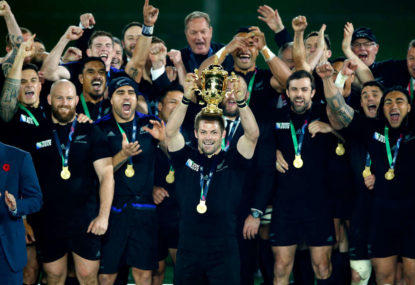As the All Blacks began their end of year tour having conquered everything thrown at them this year.
At the same time we also reached the one year anniversary of the match that proved to be the springboard for reaching the even greater heights they’ve scaled this year. Let’s look back on that historic day (or early morning for those in the Antipodes).
Yes, the 2015 World Cup final. One year ago. The 31st of October, 2015. Twickenham.
The All Blacks, the defending world champions aiming to be the first team to defend their crown. They have vanquished all who stood in their path, be it Argentina, South Africa, or the ghosts of 2007. Now all that stands between them and glory are the foes that had last defeated them – their arch-rivals, the Wallabies.
As we all know, the Wallabies had never lost a World Cup match at Twickenham, and somewhat surprisingly, have kept that record going throughout this World Cup, growing from strength to strength with every match. They are quite settled too, having played four games in a row at the same ground.
New Zealand, as was played up throughout the tournament, has not won a Rugby World Cup outside the Land of the Long White Cloud.
It is really the perfect setting. The fiercest of rivals, playing each other for the first time in the tournament with this much at stake.
The one who wins goes down in history as the first three-time champion of the world. They have traded wins before in the season, one in each country, and the final decider at a neutral venue is going to be the perfect denouement to what has been perhaps the best World Cup in a long time.
The most important man on the pitch – “Headmaster” Nigel Owens. The previous World Cup final referee, Craig Joubert, had come under a fair bit of criticism for his handling of the 2011 final, but Owens is one not to be fazed easily. The only openly gay international rugby referee, he has been through a fair bit, and has stood tall through it all.
He is easily the best choice to handle a game of this magnitude.
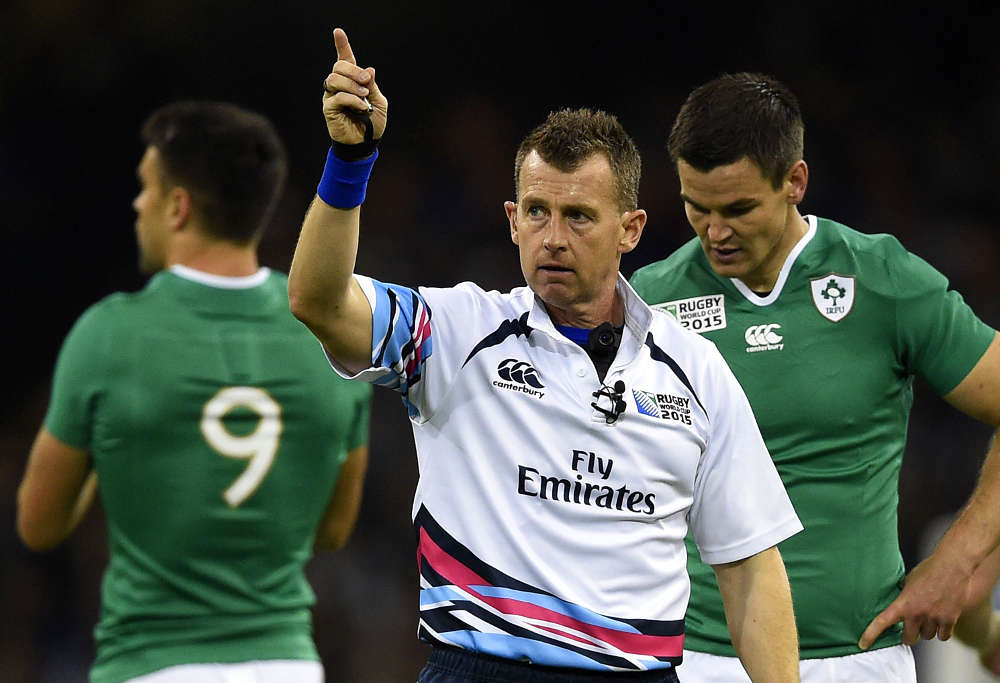
The two coaches, Michael Cheika and Steve Hansen. Cheika being the Wallabies’ saviour, juggling the dual jobs of Australia and New South Wales Waratahs coach, has steadied the Wallabies’ ship since taking over exactly a year prior to the final from Ewen McKenzie.
Winning the World Cup will ensure he goes down in history as the architect of the greatest 12-month turnaround in the sport. Having already wrested the Rugby Championship from the All Blacks, he now has his sights set on snatching the jewel in the All Black crown – the World Cup.
Steve “Shag” Hansen, former head coach of Wales, indeed the Welsh coach in that epic contest versus his home country in the 2003 World Cup, and also assistant to Sir Graham Henry during the lowest of the lows in 2007 and the highest of the highs in 2011.
Having succeeded Henry to the post of All Black coach, Hansen has taken the All Blacks to newer heights, but he knows his legacy will only be made if they win this match, otherwise he will always go down as the coach of the team who lost in the 2015 final.
The two teams – having pipped their familiar Rugby Championship rivals to the final, are without any major injury concerns. Australia’s band of merry men, some from Australia, some imported from Europe, have had an exciting, eventful path to the final. New Zealand, possessing some of the best players of all time, have swatted aside everyone with minimal fuss, with the exception of South Africa in the semifinal.
And so the game kicks off. The biggest spectacle of world rugby, involving two of the biggest nations in world rugby. Right from the get-go, the All Blacks make a statement of intent, with two ferocious hits from Jerome Kaino and Conrad Smith on Israel Folau and Michael Hooper respectively. Then, a charge-down of Will Genia’s box kick.
Wallaby captain Stephen Moore takes the lineout with a bloodied nose. The lineout is stolen.
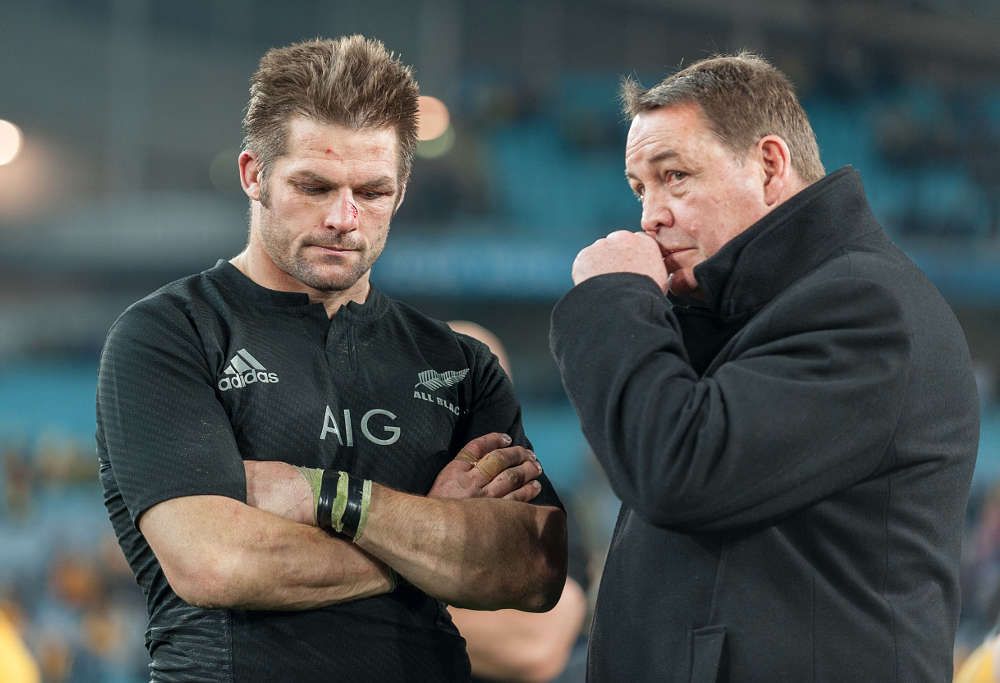
From there, Ma’a Nonu completely side-steps Tevita Kuridrani (a sign of things to come?) and charges into the Wallaby 22.
The All Blacks set up camp there for the opening five minutes, stretching the Wallabies left and right, before David Pocock is pinged for playing the ball on the ground.
The ‘Pooper’ combo of Michael Hooper at 7 and David Pocock at 8 was one of the big talking points right through the Wallabies’ campaign, and it had got off to a false start when it mattered most.
Dan Carter lines up the kick at goal. What a massive occasion this is for one of New Zealand’s favourite sons.
Having cruelly missed the opportunity four years back to win the World Cup in front of his home crowd, Carter has a score to settle at the hallowed turf of Twickers. For now, the three points would do. His metronomic boot does not fail him.
3-0 down, the Wallabies have to ensure they don’t lose sight of the All Blacks on the scoreboard.
This early start was ominous. From the kickoff, a kicking battle ensues, punctuated by a couple of turnovers. Two All Black mistakes give the Wallabies a lifeline though, and they both involve Ben Smith.
The Highlanders fullback, who has had an incredible three seasons, breaking into the All Black team, scoring tries by the bucketfull, and then becoming one of the most dangerous number 15s in the world, has led his Super Rugby franchise to their first Super Rugby title.
His virtuoso performance in the semifinal against the Springboks has not translated into the most assured start in this match though, as first he fields an Aaron Smith box kick directly in touch in the Wallaby 22 (to be truthful, the kick was a bit wayward by his Highlanders teammate) and then from the next play, he knocks on near his own 22 as Bernard Foley booted downfield to relieve some pressure.
And boy is the pressure relieved. From the ensuing scrum, Owen Franks is penalised for binding on the arm of Scott Sio. Signs of All Black nerves?
For Wallaby scrum coach Mário Ledesma, proud proponent of the bajada, it was a sign of the Wallaby scrummaging prowess. He had transformed the Wallabies scrum from being its Achilles heel to one of their major weapons. And he, like countless Australians, would have wanted it to fire when they needed it most.
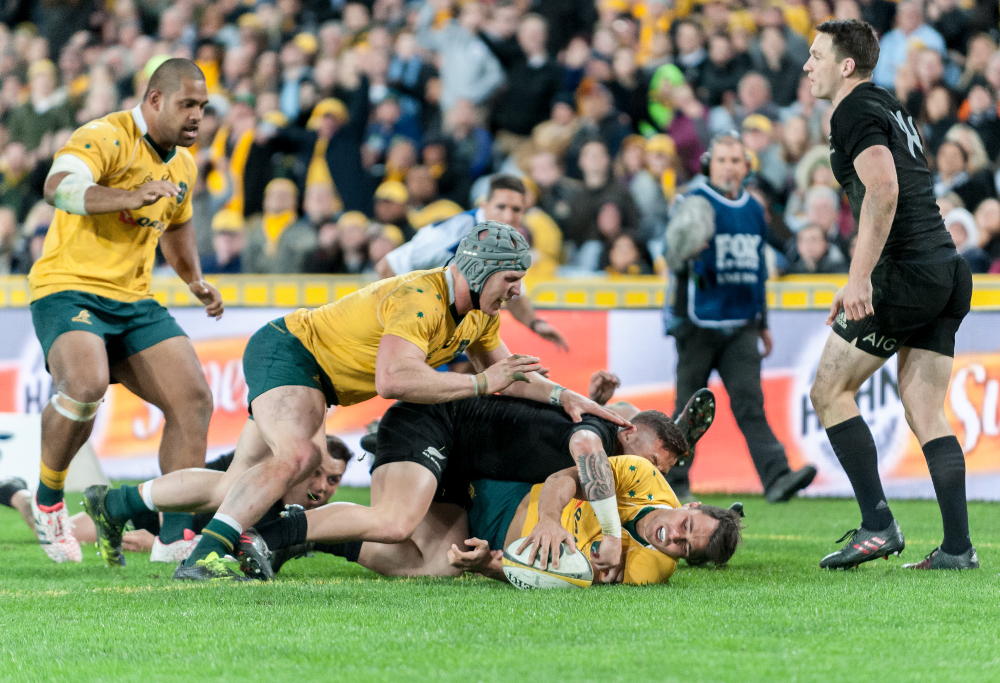
Up steps the Iceman, Bernard Foley. Absolutely nobody’s favourite player, he always seems to have his critics, failing to win them over due to some facet of his play or another.
Yet his palmarès speaks for itself. A Super Rugby title, with a winning kick from halfway in the final minute to boot, the same boot putting Scotland to the sword, justly or otherwise, in the quarter-final, the same boot (and running game this time as well) dumping the Auld Enemy out of their home World Cup, lathered in ignominy.
And here he is, entrusted with the task of ensuring his country do not lose sight of the All Blacks on the scoreboard. He was never going to miss.
From the next kickoff, the All Blacks spin it out wide through the hands to the human wrecking machine that is Julian Savea, but just when you thought he’s got away, Pooper comes to save the day, first David Pocock making a crucial tackle on the touchline, and then Hooper ripping the ball away (it is actually adjudged to be a knock on).
Owens plays advantage for one phase before Richie McCaw shows the duo that whatever you can do, I can do better, effecting a turnover that belies his 34 years of age. But that’s just second nature to the great man.
In his 148th and last Test match for his country, the most-capped player of all time, McCaw still has the same burning fire inside him to lead his team to victory as he did when he first donned the black jersey back in 2001.
That fire did not die when he led his country to the promised land, in his own land, in 2011. He stayed on, knowing his job was not over yet. But it is drawing to a close now, with 65 minutes left for him to give it his all.
Not over yet.
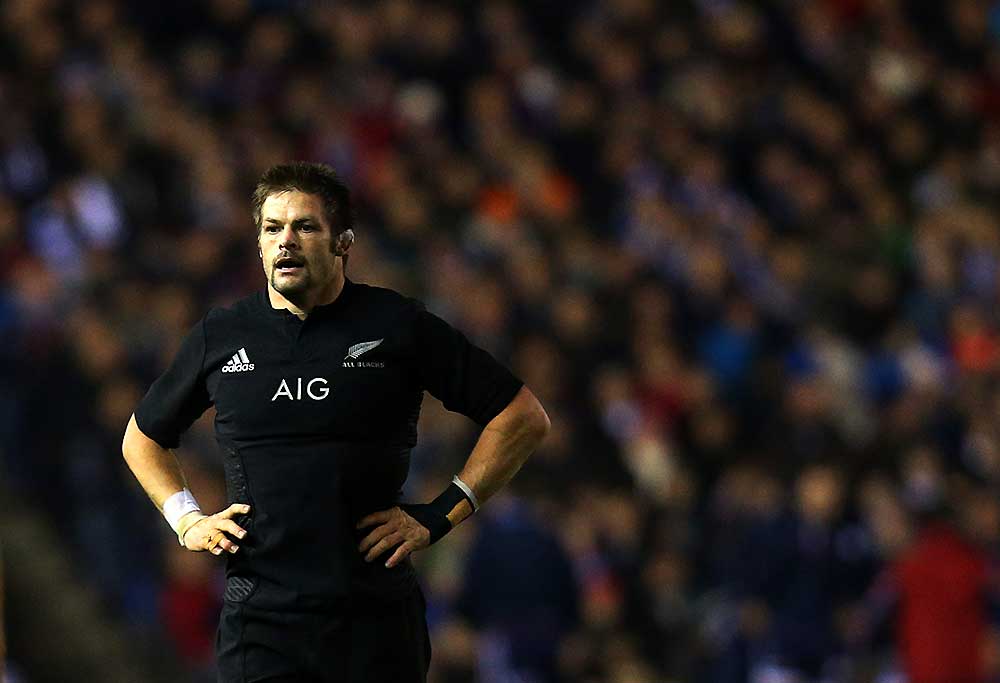
In the stoppage of play, the Wallabies are forced into their first change of the match. The ever-increasing physical nature of our sport means more injuries, and more early injuries have become all the more frequent.
Kane Douglas, the lock brought over from Leinster, landed awkwardly from the kickoff, and is replaced by former Waratahs teammate Dean Mumm.
The All Blacks win a penalty. Aaron Smith, possessing that cheek so characteristic of scrum-halves, trips over a strewn Stephen Moore, and Dan Carter sends the All Blacks up to five metres from the tryline. The rolling maul, however, is disrupted by the Wallabies.
Illegally though. Another penalty. Points on offer.
But it’s never so easy when you’re the All Blacks. They take it quickly and hit up in the centre of the pitch. However, the welcoming party is led by, you guessed it, that duo of Pooper again. Michael Hooper grins sheepishly with his blue mouth guard giving the impression of a truant seven-year-old caught stealing jam.
It would be hard not to imagine Hooper’s father, who is English, would have felt that sitting in the crowd.
Play shifts to the centre of the park. An up-and-under is not claimed by the Wallabies and the first bit of broken play for the All Black back three to feast on occurs, but they are kept in check. The ball is swung to Dan Carter who shovels it on, but there is a knock on.
And we see Carter lying strewn on the floor, in clear pain. Every New Zealander’s heart skips a beat, and that sense of dread quickly turns into indignation as the replays show Sekope Kepu hitting Carter late, clearly knowing what he is doing.
Owens tells him off and awards the All Blacks a penalty, just a penalty. Back down to the Wallaby red-zone we go.
But the pattern that has emerged also reinforces itself – with Pocock and Hooper turning the ball over, the Wallabies counter attack and boot the ball down to the All Black half, the New Zealanders return the favour just like they are wont to do, but their progress is halted by another penalty; this time the unsung hero of the Wallaby back row, Scott Fardy, doing well to disrupt the ball.
However, their good work is undone instantly, as they concede a penalty at the lineout with Rob Simmons preventing Brodie Retallick from contesting possession. The contest for the ball, the ideal that is at the heart of rugby union. The Wallabies’ transgression is lost on them, as the forwards look on in bewilderment.
The play shifts to the midfield in the Wallaby half. Brodie Retallick meets Matt Giteau, and leaves him seeing stars.
Oh, poor Matt. He missed the 2011 World Cup, cast out from the Wallabies squad by Robbie Deans. He went to Toulon, not just for a scenic getaway in the south of France, but to play serious rugby and possibly, just possibly, fight his way back into Wallaby reckoning.
And indeed, his performances forced the ARU’s hand into changing their stance towards overseas based players. Giteau had gone from being an exciting baby-faced youngster, to an outcast, to a feted veteran returning for his second coming. But his time would be cut short.
Ironically, he was the only Wallaby to be involved in a World Cup final, back in Sydney in 2003, and his contribution back then was a series of intermittent appearances filling in for Stephen Larkham, now of the coaching staff, who had got a cut to the head. Life has come a full circle for Giteau, but the improved concussion laws mean that he would play no further part in this match.
An added sense of irony with the fact that the two early substitutions were for two of the players who had been brought in as a result of the “Giteau law” – Kane Douglas and the eponymous Giteau himself.
The All Blacks are given a penalty for a high tackle. Once more, it’s Kepu on Carter. It becomes clear that Kepu is acting with a plan here – intimidate their best player. Over here, the plan backfires. Carter dusts himself up to add another three points. The All Blacks regain the lead.
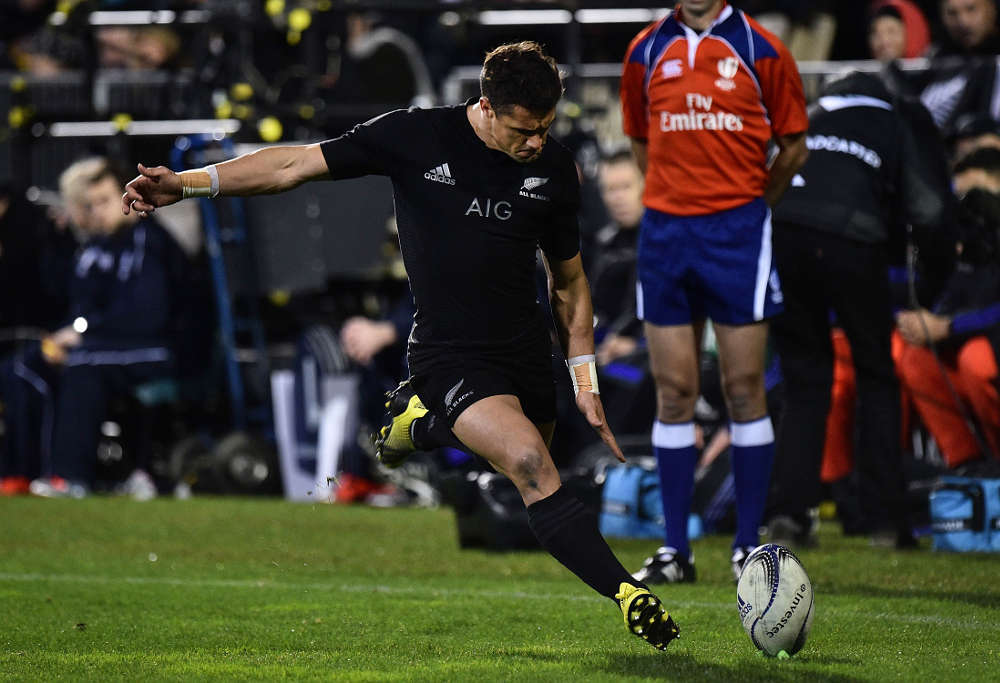
On comes the reformed bad boy of Aussie rugby, Kurtley Beale.
There doesn’t seem to be a shortage of bad boys in the Australian rugby sphere, and Beale is just one of the Three Amigos lucky enough to play a part in the World Cup final. He gets straight into the thick of things, nearly charging Ben Smith’s clearance from the long kickoff, before overcooking a kick of his own.
A couple of minutes later, he launches his rather diminutive frame into the air to pluck a testing high ball out from the clutches of Ben Smith before being dragged into touch by Nonu. Never one to lurk in the shadows, Kurtley.
A few phases on from that, the All Blacks swing it wide to the right only like they do; Carter to Conrad Smith, to Nehe Milner-Skudder, and then wide to Jerome Kaino. East and northeast though, the ball is a mile forward, and everybody expects a whistle, which duly comes.
But it is for an offside against the Wallabies. Nigel Owens asks his touch judge about the pass, and Wayne Barnes says it’s good to go.
All Blacks, Wayne Barnes and forward passes do not make a good combination. Yet this unhappy triumvirate came together on this day to render Wallaby fans the only ones seething. Carter has his toughest kick of the night, but he is a man on a mission.
Five metres in from touch, just outside the 22, the ball sails through the middle of the posts.
9-3. The first half has flown by, only five minutes remain. The Wallabies with a long kickoff, but any territory they push the All Blacks back by is negated, with interest, by Ben Smith and Richie McCaw.
First Smith offloads to McCaw who offloads to Owen Franks, taking them to the 40 metre mark, then the two offer an encore, taking play up to the Wallaby ten metre line. Former Irish forward Alan Quinlan, commentating for ITV, notes “Australia are just hanging on here.”
And hanging on they are, if only by the coattails. Miles Harrison notes “under two minutes for the All Blacks to get something; it will be typical of them, the world champions, to score now.”
Under normal circumstances this would work as a wonderful example of the commentator’s curse, but as we know, curses and hexes and hoodoos don’t work on this All Black side.
They showed it against France, and they show it here too.
Aaron Smith notes a mismatch of numbers on the Wallabies’ left edge, and bypasses one of the only two defenders on the left in Dean Mumm with a sharp bullet pass out to Conrad Smith.
The veteran bends low to take the pass and the chance is on. Here the All Blacks show their class – instead of pushing out wide, Smith turns inside to fix the cover defence, switches to Aaron Smith in support, who draws Kurtley Beale and passes to McCaw who knows better than to go for glory himself and passes to young Nehe Milner-Skudder in for the simplest of finishes.
Slick, clinical, All Black rugby.
The wunderkind, Nehe Milner-Skudder. He set Super Rugby ablaze with his side-steps, being a big part of the Hurricanes reaching the final, and getting rewarded with a call-up to the All Black squad in his debut season.
He had a losing debut against the very same opponents of this final, but still bagged a brace of tries in Sydney, and here he was scoring again. Carter punctuated the half with a conversion from the sideline.
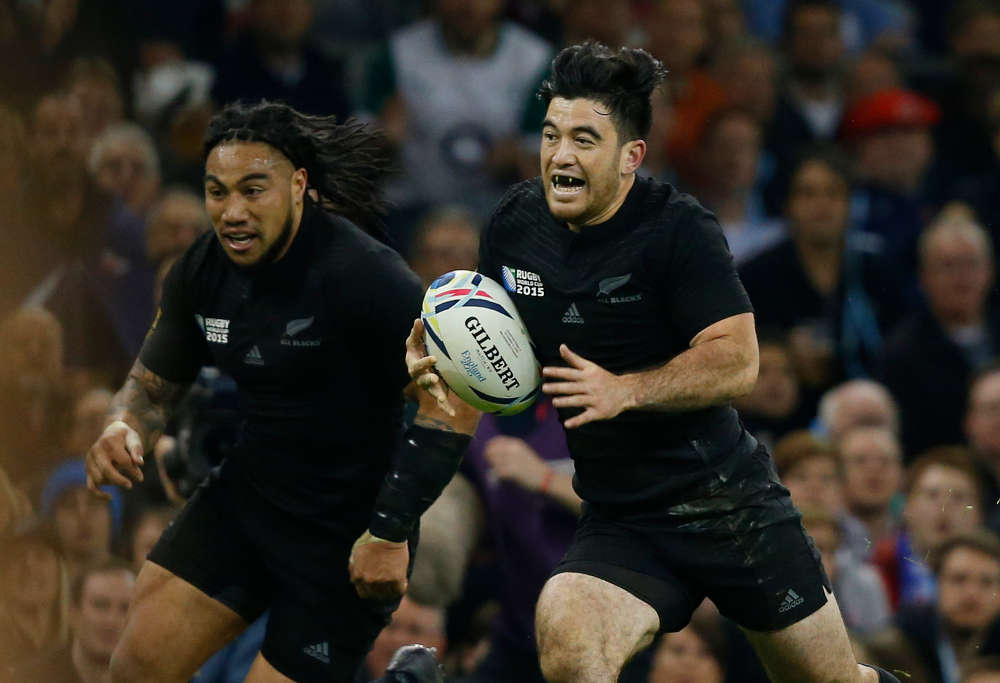
16-3 at half time. The All Blacks have one hand on the trophy. 40 minutes left to create history. Steve Hansen makes a curious tactical substitution during the break.
Conrad Smith, one of a host of players set to hang up his well-worn boots, is replaced by code-hopping, ball-flicking superstar superhuman Sonny Bill Williams.
Smith’s career is over, but he has had his say in determining whether the All Blacks will win the World Cup or not, having played his part in the try that ended the first half’s proceedings.
Australia start brightly in the second stanza, with Kepu running well at Williams, who just manages to hold on.
After not making too much headway in a minute of attack, Bernard Foley decides to chip in behind the All Black defence. The bounce of the ball deserts him though, and the All Blacks have the ball once more. Immediately Sonny Bill makes two plays that vindicate his coach’s decision to bring him on.

First, he offloads to an onrushing Milner-Skudder to gain 15 metres at once. Then from the very next play, he repeats the feat, busying two Wallaby forwards and somehow getting the hands free to find his centre partner Ma’a Nonu.
Suddenly Nonu bursts through a host of Wallaby forwards untouched, and finds himself in the backfield.
Kurtley Beale rushes to greet him, but with a step reminiscent of the one early on in the first half on Kuridrani, he has him clutching at thin air. A mad dash for the tryline puts the exclamation mark on a memorable try.
In the quarter-final too, he had gone on a similar run late in the game, but lost the ball cold with the tryline beckoning. No such mistakes here. “Little Tana” had made sure his name went down in the history books, as “Ma’a Nonu, World Cup final try scorer”.
21-3. Carter surprisingly misses the conversion. A viewer I was following the match with in India goes “that’s it, game over, no point watching now”, but something tells me that the game is far from over.
Maybe it’s just hope more than anything else. Nobody wants the World Cup final to be a one-sided blowout.
And an extraordinary passage of play shows the Wallabies a glimmer of hope. First Beale’s short ball to Drew Mitchell puts the Toulon winger in a gap off first phase.
He takes play from his own 22 to the All Black ten metre line. Richie McCaw gets his hands on the ball but the ball cannot come out from the ruck, and so by a quirk of rugby’s laws, Australia get the put-in to the scrum.
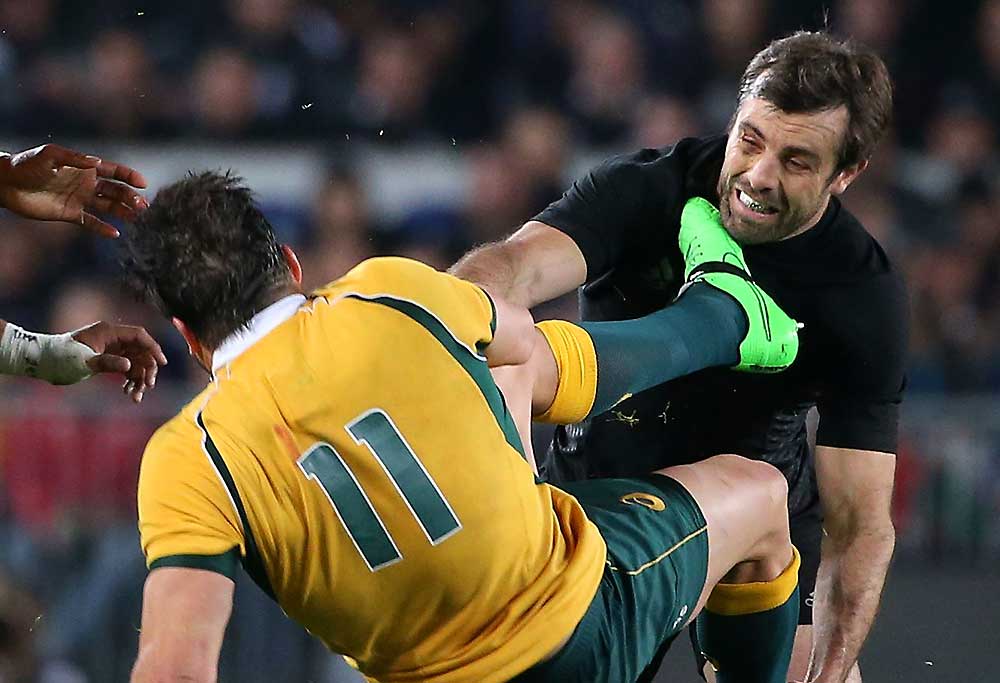
But that scrum gets obliterated by the Black tidal wave, and Aaron Smith sends Milner-Skudder away down the touchline. He throws a hail mary pass back infield, but that gets intercepted by Kurtley Beale, who sets off down on a sprint of his own, beating a covering Carter before throwing a hail mary of his own that falls into the grateful hands of Kieran Read.
The All Black vice-captain, who has been hobbling throughout the match after an early ankle injury, is tackled and penalised for holding on, Scott Fardy being responsible for the turnover.
The Wallabies are now in the attacking 22, and a sustained period of attack gets them to within five metres of the line, near the left touchline.
Will Genia passes wide to Drew Mitchell, who gets easily taken by Ben Smith and Milner-Skudder. Smith looks to arrest any second shove from Mitchell and lifts his leg, but realises that he miscalculated. Mitchell lands rather safely, but Smith knows he may be in trouble, and immediately puts his arms up to plead innocence.
Referee Owens does not mind at first, but after a double movement from the Wallabies, pulls play back to the scene of the crime.
Wayne Barnes (you just can’t keep him away when the All Blacks are involved, can you?) tells him to have a look with the TMO Shaun Veldsman, who advises a yellow card, since by the letter of the law, he has lifted him beyond the vertical, and Mitchell did land on his shoulder.
The letter of the law – that magical object behind which every 50-50 decision goes to hide. Sure, by the letter of the law, Mitchell was lifted beyond the vertical. But by the letter of the law, so did Sekope Kepu tackle Carter around the head.
Yet Ben Smith became the first player to be sin-binned in a World Cup final.
The fullback is disconsolate as he walks down to the naughty-chair. And his dejection becomes agony as from the resulting lineout, David Pocock scores what might be his 1001st try off the back of a rolling maul in 2015.
The maul, such an important weapon in world rugby today, was more or less absent from this World Cup final, but not any more. The Wallabies strike back with a timely score. The Iceman makes it 21-10.
Playing without a fullback is tough in rugby union. You are shorn of an extra body in the back field to cover up kicks, and return them too, while also missing an extra player to counter-attack with.
And the All Blacks show some uncharacteristic weakness in the minutes after the try – first Sonny Bill lets Drew Mitchell’s kick go over his head and bounce into touch, then Aaron Smith puts in a poor box kick which turns over possession with almost no gain in territory, then Jerome Kaino puts in a high shot on Pocock which inexplicably is glossed over by the referee, and finally Dan Carter fails to find touch from a penalty. This has been the All Blacks’ worst period of the match, and it is only going to get worse.
Due to the lack of a fullback, Nehe Milner-Skudder is forced to do the work of two players, and he rushes back to prevent Kurtley Beale’s long punt from going into touch in the All Black 22.
His return is not out though, and now he must go into the line to prevent his teammates from being offside. This leaves space in the back field for Genia to exploit. Miles Harrison once more foreshadows the event – “a score from Australia now will make things very interesting indeed.”
Immediately Genia puts in a perfect box kick into the All Black 22 for Bernard Foley to chase.
The bounce of the ball which worked against Foley before the Nonu try, now sits up perfectly for him and not so perfectly for the covering Julian Savea; Foley collects and has the presence of mind to pop the ball up to an onrushing Tevita Kuridrani.
He is too quick for the back-tracking Dan Carter, Savea and Sonny Bill Williams. Foley converts from in front of the posts.
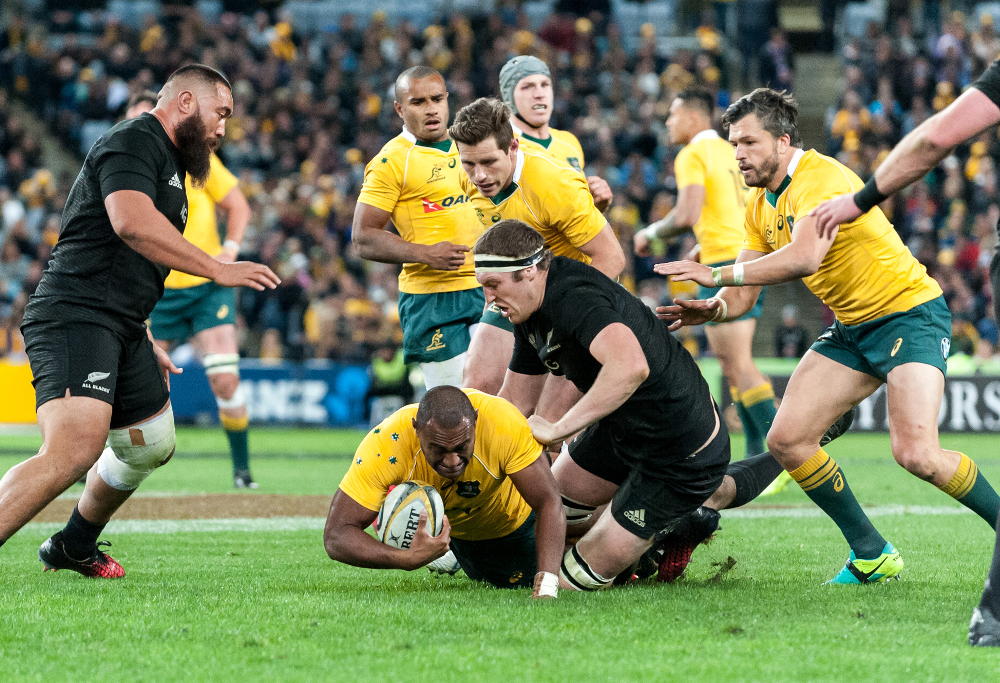
21-17. There was a point watching after all, and Australia are only four of them behind. The All Blacks are usually the masters of playing with a man down, but here on the biggest occasion of them all, it got to them.
They did not seem as assured as they had in the 52 minutes prior to the card. And it cost them on the scoreboard too. The Wallabies have had a perfect ten minutes. 67 per cent possession in the second half, the pressure just had to tell.
On comes Beauden Barrett for his Hurricanes teammate Nehe Milner-Skudder. He is known as Golden Balls by his teammates, and the origin of that term has nothing in common with the origin of the same term applied to a certain David Beckham – Barrett is just a lucky charm for the All Blacks.
Make no mistake, he is no slouch in terms of ability either, and he would prove both those claims right in his 15-minute cameo.
15 minutes. 15 minutes to save the World Cup. Who will take the game by the scruff of the neck? Step up to the plate, Daniel Carter.
First after a wayward kick by Israel Folau, he gets the ball and boots Australia down well inside their own half.
Polota Nau’s lineout is stolen, continuing the trend of the faltering Wallaby set-piece. Then after a few phases going nowhere, he decides to launch a kick into the 22. This trick doesn’t come off though, as the excellent Kurtley Beale fields it on the full and claims the mark.
However, the Wallabies are still at the wrong end of the field. Carter himself takes the hit-up off first phase, then gets up and sits back in a small pocket on the ten metre mark. Just inconspicuous enough to not attract the attention of the Wallabies.
He then gets the ball off Aaron Smith, and takes the Wallabies by surprise, just like he did the Springboks in the semifinal, by launching a 40 metre drop goal that sails over. Fittingly, the camera pans to a woman in a British and Irish Lions jersey applauding the maestro. Frustration for the Australians, however. Wallabies and drop goals in World Cup finals aren’t the best of friends.
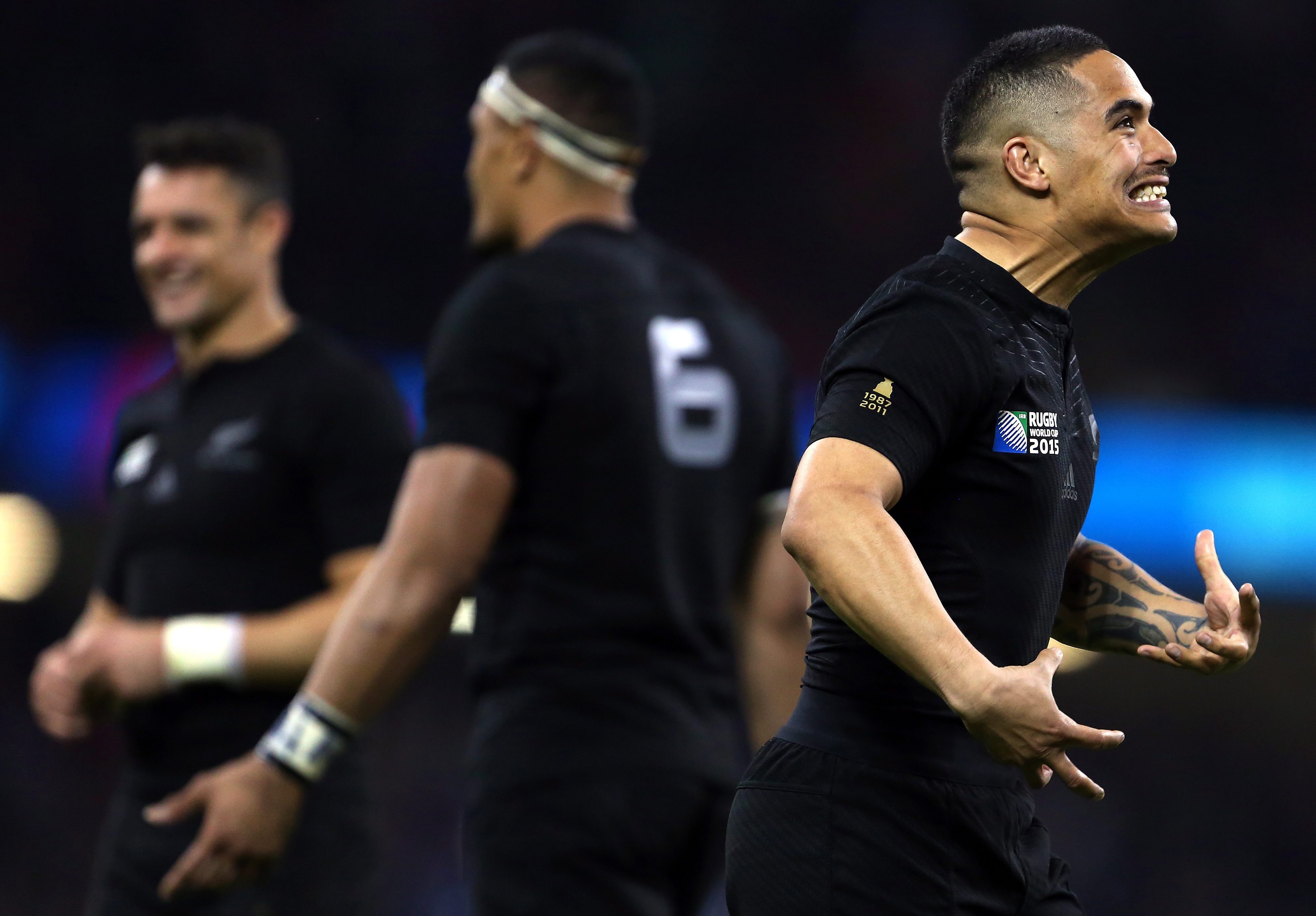
24-17. Breathing space. Only just though. The Wallabies will now need to score twice in the final ten minutes to win the match. Dean Mumm losing the ball cold under no pressure will not help their cause to that effect though. The All Blacks retain the ball, but are directionless.
Aaron Smith takes five or six steps back from the ruck behind a screen of All Black forwards to look for his fly half.
He finds him, Carter chips the Wallabies defence, and chases with every sinew of his ageing frame. The ball bounces kindly for the accelerating Beale, but he loses control of the ball and crashes straight into a brave tackle from Carter.
Scrum to the All Blacks.
There are pivotal moments in rugby matches that swing the outcome of a match in a certain team’s favour. This is going to be one of them.
The scrum goes through a couple of resets. More minutes eaten up. Tawera Kerr-Barlow and Nick Phipps have, by this point, replaced the starting half backs for both teams. Kerr-Barlow feeds the scrum. The Wallabies wheel it. Penalty to the All Blacks. Right on half way.
Carter immediately looks at McCaw, and the two old heads, in their final match together for their country, just know the right decision. A little nod of approval from the captain, and Carter will line up a monster penalty goal. The tension hangs in the air.
One more swing of the left boot, (the last as it turns out with the left) and the ball goes straight as an arrow, just having the distance to fall on the right side of the crossbar as far as New Zealand are concerned.
27-17. Carter has snatched, and retrieved, the game that was slipping away. five more minutes before history is made.
The ferocity is back in their defence now, they can taste glory, the glory that fourteen of them tasted back in 2011, but more importantly, glory that is unique to their team, and it’s driving them on, the fervour evident in each big hit they make. But every great triumph needs an exclamation mark. And boy is an exclamation mark on its way.
The All Blacks soak up three minutes of crazed Wallaby attack. Then Kurtley Beale tries a switch play with Drew Mitchell out wide near the All Black 22. Mitchell coughs the ball up, and the ball falls to the beleaguered Ben Smith.
Now he’s a free man once more, Smith. That usual evasiveness and presence of mind returns, he gets past the flailing Wallaby tacklers, and notices that no one is at fullback. A sharp kick into space, and who would be chasing from behind but the fastest player on the pitch, Golden Balls Barrett himself.
The final scoring sequence must have been replayed so many times over and over again that it would be firmly etched in everyone’s memory by now.
“Given away, Ben Smith. Barrett is chasing. He’s got Pocock for speed. This is Beauden Barrett, control this and the Cup… is his. It’s New Zealand’s. And it’s history. Confirmed. Back to back. World Cups.”
Miles Harrison’s solemn commentary was fitting for the occasion, being witness to one of the greatest sides in history having their crowning glory. Even better was the New Zealand commentary, with Grant Nisbett and Justin Marshall freed from the constraints of impartiality imposed on them in 2011 that being official broadcasters puts on commentators.
Nisbett : “Drew Mitchell’s lost it, now here’s Ben Smith in space!”
The kick is put through.
Marshall: “Beauden Barrett!!”
Nisbett (excitement rising in his voice) : “Beauden BARRETT’S got a heap of pace! He leads the charge.”
Marshall (losing all sense of neutrality, passionately bellowing) : “GO BEAUDEN!”
As Barrett controls the ball and enter the in-goal area….
Nisbett : “That should DO IT!”
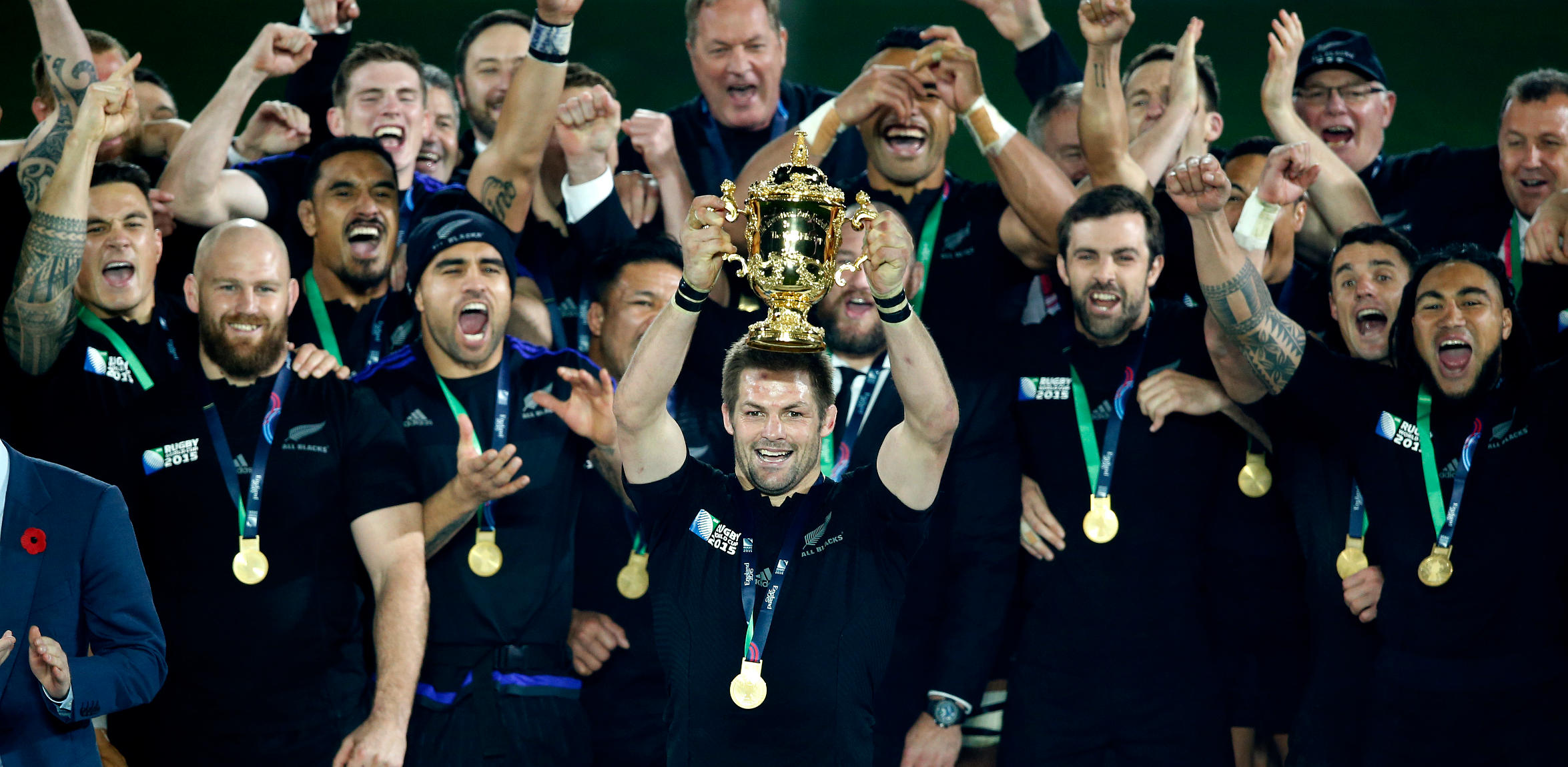
Carter puts the conversion over with his right boot. Some people felt this was a mark of disrespect, but really, cut him some slack.
He earned his moment, and deserved to go out on his own terms. The final act of the final is Ben Smith kicking the ball into touch, fitting given that his sin-binning had so nearly changed the match, and in hindsight, actually saved the match, turning it into the memorable spectacle we so fondly remember today.
The All Blacks had conquered the world of rugby, once more. In the process, they toppled down a host of records, not least of which being the first team to win three Rugby World Cups, and two back-to-back.
The dark days of pre-2011 seem an eternity ago now, the All Blacks have fulfilled their destiny as the best rugby team of all time.
The list of players to have won two World Cups blew out of proportion after this match, with 14 All Blacks joining Os Du Randt, John Eales, Tim Horan, Jason Little, Phil Kearns and Dan Crowley. Sonny Bill Williams, Jerome Kaino, and Sam Whitelock took part in their 14th consecutive World Cup match, winning all of them.
A year on, many of the All Blacks who took part in this match have moved on – Richie McCaw, Dan Carter, Conrad Smith, Ma’a Nonu and Keven Mealamu either retired, or moved to France for one last hurrah. But their legacy was rubber-stamped by their contribution to the World Cup triumph. Their replacements have seamlessly slotted in and continued their domination.
Would the All Blacks have gone on this unstoppable run in 2016 had it not been for their victory in 2015? It’s hard to say, just look at the respective fortunes of England and Australia post the World Cup.
But what cannot be denied is that this triumph was certainly liberating for the All Blacks, putting to rest any claims that they may have a chink in their armour, silencing any doubters.
And what an amazing game of rugby in which to do so as well, both teams playing their part in a fantastic advert for the game. The match will forever be remembered as the day the All Blacks proved they are the best, once and for all.
The world, in union, applauds the All Blacks.






























































































